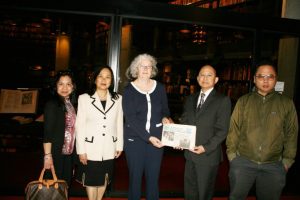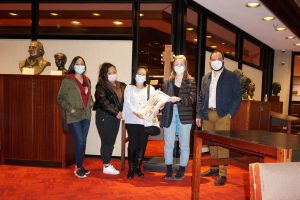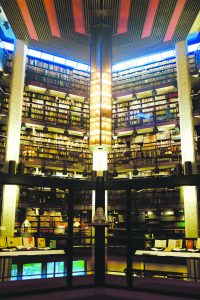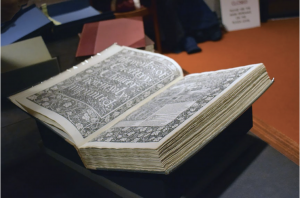The Philippine Reporter is in good hands (and in good company in the Thomas Fisher Rare Book Library)
The Philippine Reporter is in good hands (and in good company in the Thomas Fisher Rare Book Library)

File photo 2014: The Philippine Reporter’s 25-year collection of its print edition was donated (for archiving) to Thomas Fisher Rare Book Library (University of Toronto Libraries). From left: Leslie Gesell, Mila Astorga-Garcia, Anne Dondertman (Director, Thomas Fisher Rare Book Library), Hermie Garcia and Norman Garcia. (PHOTO: JOHN SHOESMITH)
By Mila Astorga-Garcia
The Philippine Reporter
This March 2022, The Philippine Reporter marks its 33rd anniversary and starts on its 34th year on continued publishing.
It also marks the 8th year that the print collection of The Reporter has been housed in the prestigious Thomas Fisher Rare Book Library – the biggest repository of rare books and manuscripts, and one of the leading research libraries in North America. The Fisher Library acquires, makes accessible and preserves comprehensive research collections of national and international significance.

The latest turn-over (March 2022): Representing The Reporter are Mila Astorga-Garcia, managing editor, Michelle Chermaine Ramos, writer, and Serena G. De Vera.
The Reporter considers it a great honor to be in good company with the treasured literary and historical masterpieces kept in The Fisher Library. “Chronologically, the range is from a 1789 BCE Babylonian cuneiform tablet from Ur, to the works of contemporary Canadian artists,” says an official description of the breadth and depth of its diverse collection.
How did The Philippine Reporter make its way to this distinguished repository of literary works?

File photo 2016: ANNE DONDERTMAN (2nd from right), Director of Thomas Fisher Rare Book Library, welcomes The Philippine Reporter staff and guests. From left: Norman Garcia, Jennilee Austria, Leslie Copada-Gesell, Bob del Mundo, David Fernández (Librarian), Jai, Daniel and David Avila, Anne Dondertman and Mila Astorga-Garcia. PHOTO: HG
Through the recommendation of then University of Toronto Professor Dr. Roland Sintos Coloma who recognized the usefulness of The Philippine Reporter to students and faculty researchers alike, the newspaper was vetted through an interview of the publishers and editors with Library officers, who saw that the Fisher Library would benefit from the unique collection.
Throughout the years, the paper had covered the history, immigration trends, issues, life and times of Filipino Canadians, and captured how they have adapted to the new country, bringing with them their heritage and culture, education, training and skills and their life stories to share with other Canadians. It also covers important events in the Phiippines that profoundly impact on the lives of Filipinos and Canadians alike.

File photo (2017):
From left, Voltaire de Leon, Rick Esguerra, Lui Queaño, Hermie Garcia, David Fernandez, Mila Astorga-Garcia, Patty Rivera and Leslie Gesell (not in photo, Ysh Cabana).
“We have not so far received any similar material, whether from the Philippines or any other community. Our focus has mainly been on historical material but we are also trying to build research collections for the future, which is why your donation is so important to us. Given that the copies you donated are the only complete run in the country, I feel it is important to archive this material for the future,” said Anne Dondertman, then Director of the Fisher Library, to co-publishers Hermie and Mila Garcia during the first turnover of the 25-year print collection during the Philippine Reporter’s 25th anniversary month.
On his part, Senior Archivist and Rare Book Librarian David Fernandez, once explained to Filipino-Canadian students participating in a tour of The Fisher Library that the significant value of the archived collection of The Philippine Reporter is that their grandchildren and their grandchildren’s grandchildren can still have manual access decades and centuries from now to the original printed newspaper reporting on the life and times of Filipinos in Canada and the Philippines, much the same way as the tour participants had manual access to the centuries-old books presented during the tour.

The interior aerial view of the Thomas Fisher Rare Book Library
On this 33rd anniversary, as a way of thanking all those who have supported the newspaper through the years, The Philippine Reporter would like to let the Filipino community know, as well as mainstream Canada and researchers in the diaspora worldwide, that they have an accessible collection of literature about Filipinos in Canada that may be useful to them now and in the future, in the good hands of The Thomas Fisher Rare Book Library.
In this issue, we highlight some testimonials from researchers who find The Philippine Reporter useful for their purposes: the academe, a natioal advocate organization and the community.
Philip Kelly, PhD, Professor of Geography, Associate Dean for Research, Graduate and Global Affairs Faculty of Environmental and Urban Change, York University
“I have been running the ATE project at York University since 2017. ATE is the Alternative Transnational Economies project, which is a research initiative to trace the ways in which alternative economic and political imaginations connect Canada and the Philippines. One component of the project has involved conducting a long-term examination of how President Rodrigo Duterte is represented in Filipino-Canadian media. The Philippine Reporter’s print collection in the Thomas Fisher Rare Book Library has been invaluable for this undertaking. For several years, students from York have been accessing the papers as research assistants for the project and compiling what we call our “Duterte Diaspora Database.” The collection truly provides access to the pulse of the Filipino-Canadian community, year after year, in precisely the format that the news was circulated (including elements that do not appear in online archives). We could not have undertaken this research without access to The Philippine Reporter collection. Thank you to Hermie and Mila for their remarkable service to us all. In the words of Neil Young, ‘Long May You Run’!”

First Biblical History of the world
Stefanie Martin, Archivist (Master of Information) Secretary General, Migrante Canada
“The Philippine Reporter has been an important resource of news and information from Filipinos in Canada, in the Philippines and across the world. Having copies of The Philippine Reporter preserved at the Thomas Fisher Rare Book Library is of great significance as this allows our community members to have access to the history of Filipinos in Canada and how issues in the Philippines continue to affect us as a diaspora. As a Filipino archivist, the preservation and access to our history as immigrants is vital in strengthening our community and our connection to our homeland. The work of The Philippine Reporter proves to be critical in exposing issues affecting Filipinos overseas and in the Philippines and amplifying the stories of our kababayan since these information are not easily accessible in mainstream news and institutions especially for the younger generation.”

2015 File photo: David, Daniel and Jai Avila, St. Michael’s Choir School students view The Philippine Reporter archived collection.
The Philippine Reporter has also been valuable to community members who treasure articles written about family, acquaintances, organizations, and causes, that they find the paper worth keeping.
Following is the story of one of our writers, Irish Mae Silvestre, on how she helped a reader get hold of a copy of The Philippine Reporter during a difficult Covid summer.
“It started with a Facebook message and a simple but touching request: Clarence and his sister Mylene were looking for a copy of a story about their mother who had been featured in The Philippine Reporter. Their mother, Julie Dingle, had passed away from cancer while working in Canada as a nanny. Unfortunately, their one copy of the paper from the ‘90s had been damaged in a flood in the Philippines.
So, when Clarence contacted TPR last summer asking for a copy, I reached out to the Fisher Library. As article was in one of the few missing issues The Reporter still had to replace, having been previously destroyed in an office basement flood after a fire, the next recourse was to reach out next to Library and Archives Canada that had once maintained a subscription to the paper.
The Library confirmed they did indeed had a copy, and though I had to wait for months because of Covid, I finally received the digital copies. It was worth the effort to be able to help a member of the community acquire a small memento of a beloved mother.”
While users are appreciative that a resource like The Philippine Reporter is being archived and made accessible for research in Canadian libraries, the latter in turn are just as grateful for the presence of a rare print collection of a community ethnic newspaper in their holdings.
Loryl McDonald, associate chief librarian for special collections, in a letter thanking The Reporter for the “generous contribution,” says: “The Fisher Library could not have built up its varied and fine collections without our friends. We are most grateful.”
Meanwhile, in a related development, through a federal program, Local Journalist Initiative (LJI ) administered by the National Ethnic Press and Media Council of Canada (NEPMCC), regular printed copies of The Philippine Reporter are now being distributed in six provinces– Ontario, BC, Quebec, Alberta, Manitoba and Nova Scotia – and are targetted towards remote communities and difficult to reach populations. Though limited in number, the print copies are useful not only for the news but also for research and educational purposes, so that some readers keep the paper on file, according to regular recipients in the said provinces.
Comments (0)